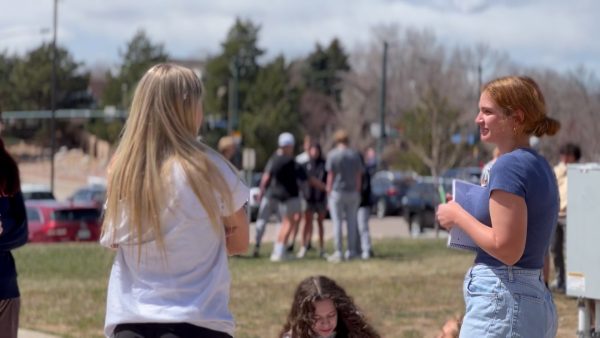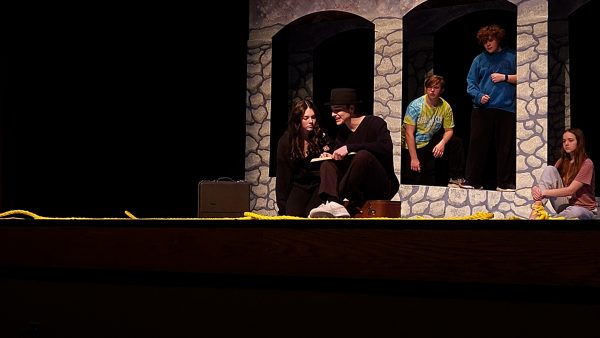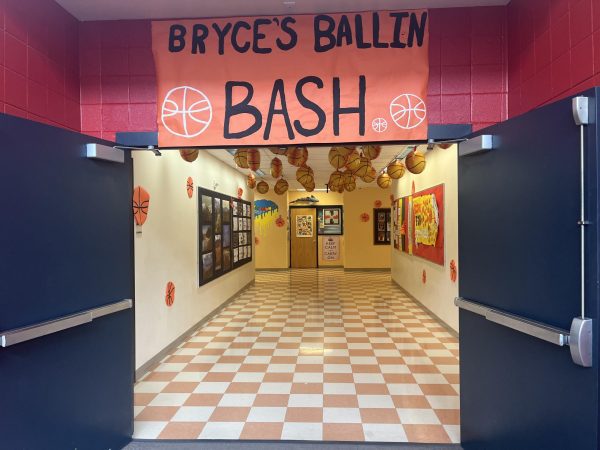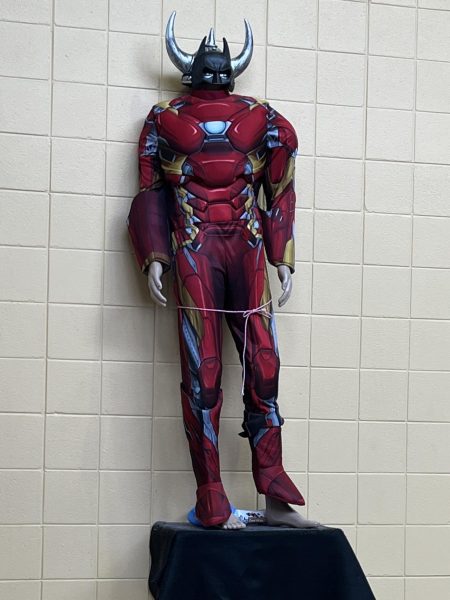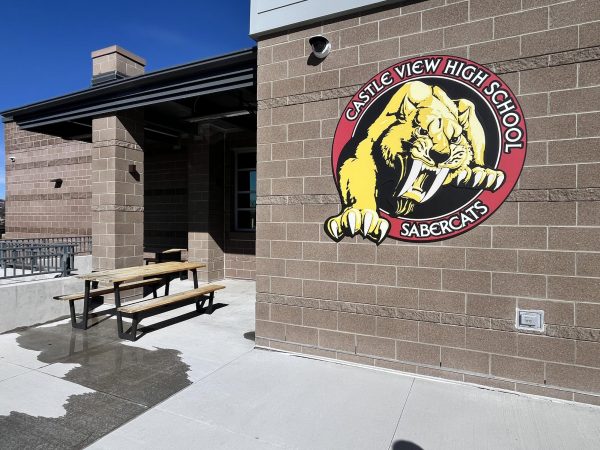Community Values Sustain Denver-Area Bookstores
by Mitchell Davis
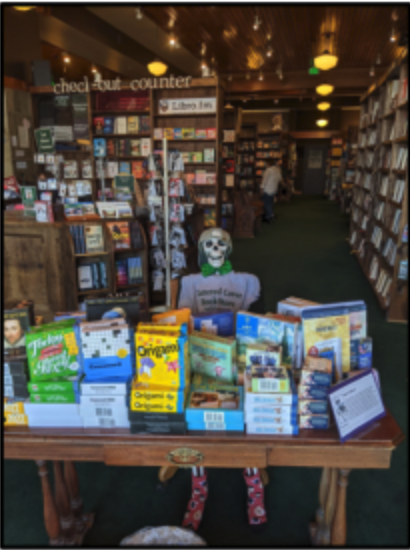
A skeleton greets me when I walk through the door. He is sitting behind a desk with puzzles and games on it, wearing a backwards ball cap, a green sequined bow tie, and a T-shirt which reps the skeleton’s employer, The Tattered Cover.
The Tattered Cover is a chain of bookstores in the Denver area. The chain’s website proudly proclaims it “the largest independent bookstore in Colorado.” Since the first Tattered Cover’s opening in 1971, the business has undergone a bevy of expansions and relocations. There are currently five main locations in and around Denver, with plans for more.
When the first Tattered Cover opened about fifty years ago, the internet was a tiny network known only to researchers. At the risk of understatement: since then, things have changed. The internet became familiar to regular people in the 1990s. According to a CNN timeline by Lydia DePillis and Ivory Sherman, early in that decade, in 1994, Jeff and MacKenzie Bezos created Amazon. At first the company only offered books, but over the years it expanded, adding music in 1998 and clothes in 2002. It introduced the Kindle e-reader in 2007 and bought the audiobook company Audible in 2008. Since then it has continued to expand with astonishing speed and scale. The pandemic caused that growth to accelerate even further, as money that wasn’t being spent at bars, restaurants, or malls found its outlet in online shopping. According to GoBankingRates, today the company is valued at $1.7 trillion. Rephrased, that’s seventeen hundred billion dollars.
The flip side of Amazon’s pandemic growth was the contraction of physical businesses. Strict lockdowns and fear of contagion confined people to their homes. Downtowns stood deserted, and the stores that called those downtowns home — bookstores included — began to suffocate with no customers to sustain them. The pandemic hit The Tattered Cover hard. Len Vlahos, a former owner, told Denverite’s Ana Campbell in an interview, “The honest truth is that the impact of the pandemic on the business financially has been devastating. We closed our Colfax location for three months and our LoDo location for four months. The numbers were looking grim.”
It may seem that the pandemic acted to hasten the end of a business model already in decline. Some of us remember Borders. Barnes & Noble is headed the same way, having lost $126 million in fiscal year 2018, according to an article from the Wharton School. However, while those two companies maintained physical locations, they were still big chains. In contrast, small-business bookstores had actually been faring well before the pandemic. A 2017 article by Carmen Nobel on Harvard’s Working Knowledge website reported the count of such bookstores grew by thirty-five percent from 2009 to 2015, a time when Amazon was rapidly expanding. This is possible because local bookstores don’t just sell books. They offer an experience that Amazon and Barnes & Noble cannot.
The Tattered Cover’s leadership firmly believes that the company’s focus on experience and community will allow it to thrive. The store changed hands amicably in December of 2020, as a way to move forward after the pandemic. The Tattered Cover’s former owners explained in an open letter that the new management could provide the leadership and investment that the struggling store needed. The new CEO, Kwame Spearman, said in a statement: “The Tattered Cover, and all it embodies for us as Denver natives – reading, learning, the independent spirit, buying local, and most importantly community and connection – are the ingredients that drew us to this endeavor.” Spearman’s words are echoed on the company’s website, which declares The Tattered Cover’s mission: “To be a haven for knowledge, community, and conversation for the next 50 years.” The company’s aggressively alliterated values are “Discourse, Discovery, Destination, Distinction, Diversity, Denver.” It’s clear that the people behind The Tattered Cover see the store as not only a book pusher, but as a “cultural institution,” in the words of Spearman.
On a Sunday afternoon in the fall I paid a visit to The Tattered Cover’s Littleton location to experience the cultural institution for myself. Right inside the door was the skeleton I introduced earlier. His name is Albert. (“Some of his favorite books include Stiff by Mary Roach…” says a placard on his desk.) Behind that introductory display was a customer-service desk and then tall wooden bookshelves which filled the store. The bookshelves were arranged in alcoves with one open side, so that as I walked through the store, I could step out of the main aisle and be surrounded by books of a particular genre. There were shelves which displayed books by local authors, as well as books recommended by staff and customers, each of these with a handwritten note introducing it and explaining its merits. The store also featured stands which displayed the books that the various Tattered Cover book clubs were then reading, along with a reminder on when the next meeting would be. As I walked through the store, I saw lots of books that I’d heard about and wanted to read. The lighting in the store was soft and there were tables and chairs in every corner. Whenever I needed to sit down — to jot some notes or to answer a text — there was always a chair right there. And the store smelled like books. It was a literary Cinnabon — a wonderful, instantly recognizable scent that conveyed to all who inhaled that this was an honest-to-God bookstore, a place to meander, to pick out a few books that looked intriguing and then to sit in a quiet corner and crack them open and, if they were good, to take them home.
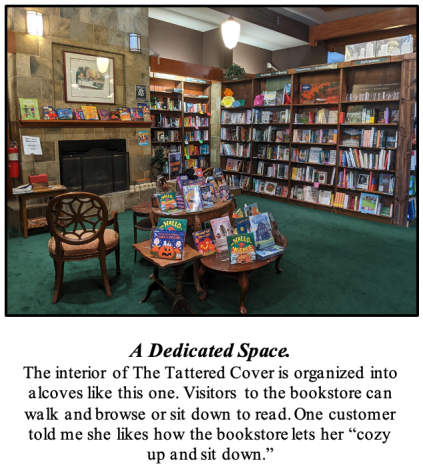
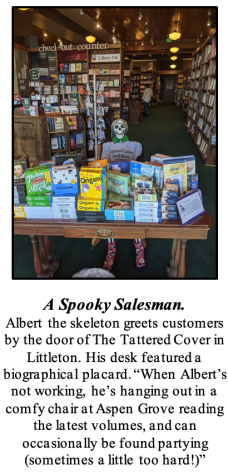
I spoke to the woman at the customer-service desk, Stephanie, about her job and about the store. “It’s an interesting job,” she said. “People think it’s all just reading, but it’s not.” Her favorite aspect of the job is “finding the right bookfor somebody who’s looking for themselves or someone else, or recommending something that they never thought of and having them take it and enjoy it.” Why do The Tattered Cover’s customers shop there? “It’s customer service, essentially. We know our books.” And, while the pandemic was difficult, she feels the store is rebounding: “I think we’re certainly building back our clientele since COVID shut us down.”
The reasons customers gave for liking the store were familiar. I spoke first with an older man named Rick. He came to the Tattered Cover for “mountaineering literature,” and prefers visiting the store to shopping online because he can “look through books” — read them, get a feel for them — before purchasing any. Rick is a regular to The Tattered Cover; he used to visit a bookstore which focused on mountaineering books, but it moved completely online. About The Tattered Cover, he said, “I hope it sticks around.”
Next I met an elderly woman named Pam. She used to frequent the original Tattered Cover in Cherry Creek. Both Pam and The Tattered Cover have since moved, but she still makes a point of visiting the store when she’s in town. “We love Tattered Cover. I love Tattered Cover,” she said. She goes to the Littleton location because it is the “closest one to family here, very convenient.” Speaking about why she likes the bookstore, she said, “Variety and the staff, number one. They’re very helpful. And if they don’t have [a book], they’ll get it. And it’s quiet. … Reading is my hobby and it makes me happy to come here.” After she answered my questions, she asked me about my ambitions, since I had introduced myself as a journalism student. I mentioned the author Jon Krakauer as someone who inspired me, and she pointed to one of his books, which happened to be right there on the shelf next to us. We talked a little bit about Krakauer, and after the conversation ended, I realized that I had experienced for myself what I had read and heard so much about — the conversations that a bookstore enables with other people who have read the same books and the same authors.
Last, I talked to a mother, Melanie, and her daughter, Madison, who visit the bookstore a “couple times a month.” Melanie has recently gone back to school, studying fine arts. That Sunday, the duo was in the store looking for “books on self-improvement.”The things Melanie likes about The Tattered Cover are the “good atmosphere”: the store is “cozy” and — this she had in common with Pam — “quiet.” And she likes that the store has chairs “to cozy up and sit down.”
My experience at The Tattered Cover convinced me that the statements I had read by the store’s owners about why people love the store are true. A bookstore offers an experience that the internet cannot. Another bookstore, this one closer to home, reflects the same truth.
Sudden Fiction is a bookstore in Castle Rock. It occupies a small space tucked into the ground floor of Ecclesia, the former church downtown on Perry Street which now hosts restaurants, a bar, and a jewelry shop, along with the bookstore. Co-owners Joe Durst and Gina McReynolds launched the store less than three years ago, their first foray into running a bookstore. Sudden Fiction is much, much smaller than The Tattered Cover, but it has a lot in common with its more famous Denver sibling.
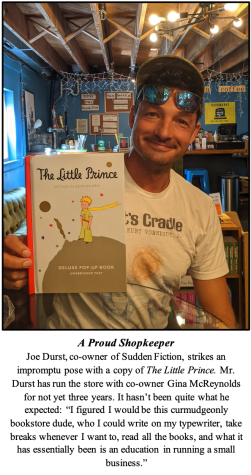
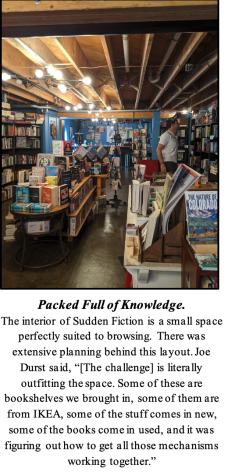 Sudden Fiction is, both literally and figuratively, closer to home for me. I live in Castle Rock, and I like to stop by the bookstore whenever I’m at Ecclesia. Both my dad and I have gone out of our way to buy books from there. Recently I needed a copy of a book within two weeks’ time. I could have ordered it from Amazon, cheaply, and had the book on my doorstep two days later. But instead, I called Sudden Fiction and asked them to order the book for me. About a week later, I picked it up and paid more for it than I would have on Amazon.
Sudden Fiction is, both literally and figuratively, closer to home for me. I live in Castle Rock, and I like to stop by the bookstore whenever I’m at Ecclesia. Both my dad and I have gone out of our way to buy books from there. Recently I needed a copy of a book within two weeks’ time. I could have ordered it from Amazon, cheaply, and had the book on my doorstep two days later. But instead, I called Sudden Fiction and asked them to order the book for me. About a week later, I picked it up and paid more for it than I would have on Amazon.
Why? When I spend my money there, I feel good about it, because I know my dollars are going to real people who live in my community, not distant shareholders of a vast, impersonal corporation. Unique small businesses give downtown Castle Rock its character, and I want to support them. An interview revealed that many other readers and gift-givers share in that sentiment.
I visited Sudden Fiction on a Tuesday to speak with co-owner Joe Durst. The store opens at eleven. I arrived several minutes early and waited for it to open. When the store opened, Mr. Durst set up a yellow sign on the sidewalk outside which featured the store’s logo — an owl — and its slogan, “Bookmarks are for quitters.” Mr. Durst was expecting me, and we sat down in the store for an interview. The interior of the store is a small space, crowded with bookshelves sorted by genre and tables prominently displaying certain titles. The walls are blue and the ceilings are wood. It feels like a reading nook.
Mr. Durst discussed what makes it possible for Sudden Fiction to succeed. The economy of scale favors big chains: “That’s the only thing that makes [Sudden Fiction] work, is not having big-box competition. We absolutely could not have the same amount of daily offerings as Barnes & Noble… they buy books by the thousand and then ship them to their various stores. We buy books by the five or so and then wait for [them] to sell.” The advantage of Sudden Fiction is that it’s “hyper-localized”: “Not only do we have local authors from the area, the state, the town, the county, but also it is super easy to get regulars in here, know what they like, get that in, and then tune the bookstore to what Castle Rock and the surrounding area needs.” Because of Sudden Fiction’s nature as a small bookstore which calls one community home, it can tailor itself to that community in a way that Amazon or Barnes & Noble never could. (The article from Wharton echoes this, saying, “Barnes & Noble’s size and scale… make it hard to foster the kind of intimate community center ambience it wanted.”)
In addition to the right books, Sudden Fiction offers an experience surrounding those books that only a local bookstore can. Firstly, it’s a space for browsing, in symbiosis with its neighbor businesses in Ecclesia: “We always had the merchant vendors here, so it was easy to not have food … we do coffee, and we do beer and wine, the same as the bar upstairs, and that lets people walk around from various shops in here … and get books and eat good food and have drinks and mill about in Ecclesia.”
Most importantly, Sudden Fiction is a space for conversation, for the exchange of ideas — for connection with community. Mr. Durst described a book signing that Sudden Fiction hosted over the summer: “It essentially became exactly the type of experience you want with a bookstore, which is people coming in and getting their book signed and talking with the author and being able to mill about in the space.” Writers and readers from the area could connect with each other and talk about the ideas in their books. In the end, it’s about people.
“The reason people shop here is absolutely because everyone who comes in here gets one of the two owners, or one of our very few employees, and gets that local connection. We know who you are, we know what you want to read, we talk about what’s going on in the community and how it’s affecting you and us,” Mr. Durst tells me. “Bookshops have always been a place that encourage[s] pluralism, and multiple ideas. You think about some of the authors that have been banned and some of the authors that have been promoted throughout the years. Bookstores have always been a place that encourages popular content — big books, that everyone’s reading — and also stuff that you can’t find, or that might be controversial. We have all of that stuff on our shelves and we want to get into all of those conversations with people who shop here. And that’s [borne] out, that you can’t do that with Amazon, you can’t really do it at Target, even if you can get some of the same books.”
The things Mr. Durst told me reflected what I found at The Tattered Cover. People still value the experience of a bookstore — browsing the shelves, sitting down to read in a comfortable chair, sipping coffee, turning pages, talking to staff for a perfect book recommendation. One cannot have that experience anywhere else.
One anecdote in particular that Mr. Durst shared is telling. He said that some customers “send us the Amazon readout of the book they’re looking for and then say, ‘Can you get this for close to the same price?’” If convenience mattered to those people, they would never do that.
It is for that reason that I do not fear for the future of independent bookstores. While they cannot beat Amazon on price or convenience, they don’t have to. As long as local bookstores lean into the unique experience that only they can offer, readers will continue to walk through their doors, with no plans but to spend an afternoon in a quiet place that smells of books.


